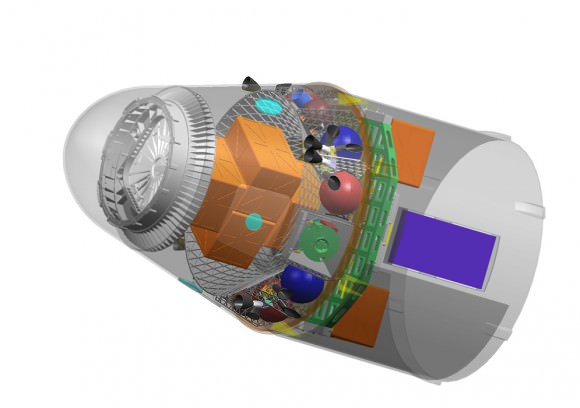[/caption]
Elon Musk conceded that the space business world is an extraordinarily difficult place to make money. But that isn’t his main priority anyway.
“The reason I’m doing SpaceX,” Musk said during the Falcon 9/Dragon post-flight press conference, “is that I just happen to have a very strong passion for space and I want us to become true spacefaring civilization and even a multi-planetary civilization. That is my goal for SpaceX.”
“Other companies have profit goals and such, but for SpaceX it is really about furthering the cause of space,” Musk continued. “We must bring in more money that we spend, but maximizing profitability is not really what it is about.”
Musk said he has been upfront with investors in SpaceX that a high profit margin is not his priority, “and so they can’t be mad when that doesn’t happen.”
He added that he wants to make science fiction –“what you read about the future,” — to become reality.
The discussion of profit started when Musk revealed that the Falcon 9 second stage was restarted and flew to 11,000 km (6,800 miles) to release some secondary satellite payloads, including a U.S. Army nanosatellite. SpaceX was paid minimally for only some of those payloads, Musk said.
Wednesday’s test flight was the first of three financed by NASA under a $278 million Commercial Orbital Transportation Services (COTS) agreement, the main cog of a program designed to encourage commercial space companies to develop rockets and spacecraft to deliver cargo – and later perhaps crew — to the International Space Station after the space shuttle is retired next year.

After the Dragon’s initial success, Musk said he hopes NASA will consider allowing Dragon to go directly to the International Space Station on the next flight, estimated to take place in mid-2011. Since Dragon is capable of carrying 5987 kg (13,200 pounds) of cargo in pressurized and unpressurized cargo bays, it can bring more than twice as much cargo as Russian Progress resupply ships.
Musk also thinks Dragon can compete with Lockheed’s Orion capsule, the only part of the Constellation Program that NASA has maintained.
“What I’m hopeful for is that NASA may consider the Dragon as good as Orion,” Musk said. “It is good to have multiple companies doing something, so Lockheed has Orion and we have Dragon and we would certainly like to have Dragon considered for anything that Orion could do. Perhaps we could do more because our heat shield is significantly more advanced.”
While Musk said SpaceX could not have gotten where it is today without NASA’s support and path-making, Alan Lindenmoyer, manager of NASA’s Commercial Crew and Cargo Program Office, said with the success of this flight, the benefits might be going both ways.
“As much as SpaceX is learning from NASA, there are certainly things we can learn from SpaceX,” he said.


Elan Musk makes good economic sense by saying, “I want us to become true spacefaring civilization and even a multi-planetary civilization.” The expansion of humanity to LEO and then the Moon will open doors for further steps outward. Who knows how far we might eventually go? The stars? Of course this goal isn’t shared by those who fear the unknown or prefer the status quo, but some of us feel that it is an inevitable part of our evolution, should we choose to survive ourselves.
Awesome! I am glad to see some people out there with a genuine love for space exploration! Keep up the great work!
This is exactly the kind of attitude the space-based corporations will need to take. What is the point in chasing high ROI’s if the risk of loosing the actual space vehicle or payload because of failure or malfunction is calculable? Any (good) investors know that, so I’m very pleased this company is taking pride in communicating that message. Hopefully this will get us closer to manned-Mars missions… I’ve still got 50+ years of life… I certainly hope I get to see that happen.
This is all very exciting. It’s a shame that the cold hard reality is that this science-fiction fantasy of a multi-planitary civilization quickly fades into a financial/political nightmare once you run the numbers and gage the returns.
Maybe in a thousand years if we continue to technologically advance without any major disruptions, we can reach somewhere worthwhile to live.
In times like these we need visionaries like Elon Musk. He knows damed well he’ll not see his vision realised in his time but he’s still hoping to lay the foundations for it. Fabulous. Kudos indeed.
Well done to Elon Musk. Doing exactly what I would do if I had the cash.
I greatly admire Elon Musk for saying: “Other companies have profit goals and such, but for SpaceX it is really about furthering the cause of space.” He added that he wants to make science fiction –“what you read about the future,” — to become reality.
It takes a very brave (or foolish?) man to say such a thing in a profit seeking culture! I admire him also for his desire to make SciFi reality!
I hope they continue their vision by not just getting humans in to space, but letting the planet watch their successes and failures along with them. Would have loved to see a live stream of the Dragon splashdown or even a continued webcast beyond just Dragon sep. Not complaining as SpaceX is required to deliver us absolutely zero and they have already delivered a great webcast for F9F2, but it sure would be awesome to get the planet excited about this stuff even more!